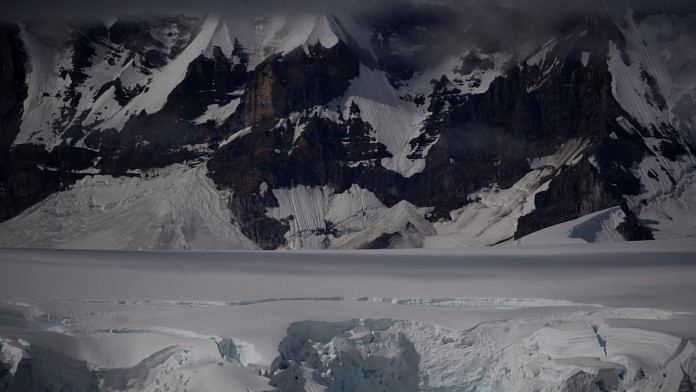New Delhi: The Indian Antarctic Bill, 2022, passed in the Lok Sabha on 22 July, makes it easier for the government to ensure that research and other activities conducted at the South Pole by its citizens do not violate any of the international treaties India is party to.
The Bill aims to extend India’s jurisdiction to the country’s research stations at the South Pole and hold its citizens working there accountable to the country’s law. There has been no specific legislation in this regard so far, 41 years since India’s Antarctic expeditions began in 1981.
The legislation not only seeks to regulate the activities in the region, but also to protect the pristine Antarctic environment from non-native species, pollution and radioactive experiments.
The Indian Antarctic Bill will apply to any person, vessel or aircraft that is a part of an Indian expedition to Antarctica, which includes the continent, its ice-shelves, and all areas of the continental shelf adjacent to it, and all its islands.
It also includes the air space south of 60° South latitude — which means activities on Indian aircraft over the South Pole will also fall under the purview of the bill.
Among other things, the bill will allow the Indian government to enforce the three international treaties linked to the region — the Antarctic Treaty, the Convention for the Conservation of Antarctic Marine Living Resources, and the Protocol on Environmental Protection to the Antarctic Treaty.
Also read: Soot from research & tourist activity hastening snow melt in Antarctica, finds global study
The treaties
The Antarctic Treaty came into force on 23 June 1961 after ratification by the 12 countries then active in Antarctic science. The treaty aims to demilitarise Antarctica, making it a zone free of nuclear tests and radioactive waste and ensures that the area in the South Pole is used for peaceful purposes only.
The Convention for the Conservation of Antarctic Marine Living Resources was established in 1982 in response to concerns that excessive krill fishing activities could impact the Southern Ocean ecosystem.
In 1991, the Protocol on Environmental Protection to the Antarctic Treaty was adopted and the countries party to it committed to protecting the environment of the Antarctic region and its dependent and associated ecosystems.
The protocol, as explained by the Australian Antarctic Program, designates Antarctica as a “natural reserve, devoted to peace and science”. It also establishes “environmental principles that must be a fundamental consideration in the planning and conduct of all activities”, and prohibits mining in the area indefinitely.
It also requires that all proposed activities must be “subject to a prior assessment of their environmental impacts”.
Permits, penalties
The bill provides for the establishment of a ‘Committee on Antarctic Governance and Environmental Protection’ that will be formed by the central government and chaired by the Secretary of the Ministry of Earth Sciences.
This committee — consisting of 10 members from various ministries and organisations, including defence, external affairs, Indian R&D institution National Centre for Polar and Ocean Research, and the National Security Council Secretariat, among others — will be responsible for granting permits for various activities in the South Pole.
The committee, which will also have two experts from the Antarctic environment and geo-political fields, will be responsible for implementing and ensuring compliance of relevant international laws for protection of the Antarctic environment.
A permit by the committee or written authorisation from another party to the protocol will be required for carrying out expeditions in Antarctica. A permit from the committee will also be required if a person wants to enter or remain in an Indian station in Antarctica, drill, dredge or excavate for mineral resources, or even collect samples of mineral resources.
The bill will allow the committee to regulate activities that may harm Antarctic flora and fauna, as well as waste disposal by a person, vessel or aircraft in Antarctica.
To gain a permit, the applicant will have to carry out an environmental impact assessment of the activities proposed by them, as well as prepare a waste management plan for the same.
Nuclear explosion or disposal of radioactive wastes, introduction of non-sterile soil, and discharge of garbage, plastic or other substances into the sea will not be permitted.
The bill also specifies penalties that can be imposed for violation of its provisions. For example, conducting a nuclear explosion in Antarctica will be punishable with an imprisonment of 20 years, which may extend to life imprisonment, and a fine of at least Rs 50 crore.
Drilling for mineral resources or introducing non-native animals or plants in Antarctica without a permit will be punishable with imprisonment up to 7 years and a fine between Rs 10 lakh and Rs 50 lakh.
(Edited by Zinnia Ray Chaudhuri)
Also read: Endurance, ‘Titanic of polar exploration vessels’, is found 107 yrs after Antarctic shipwreck



